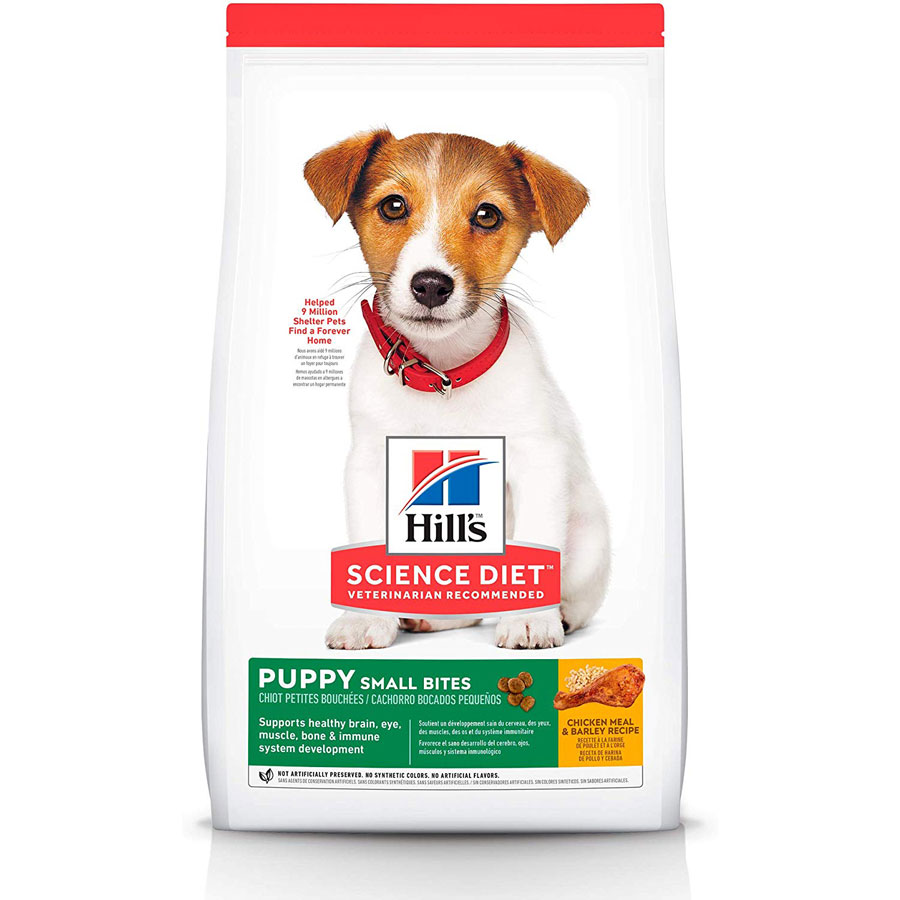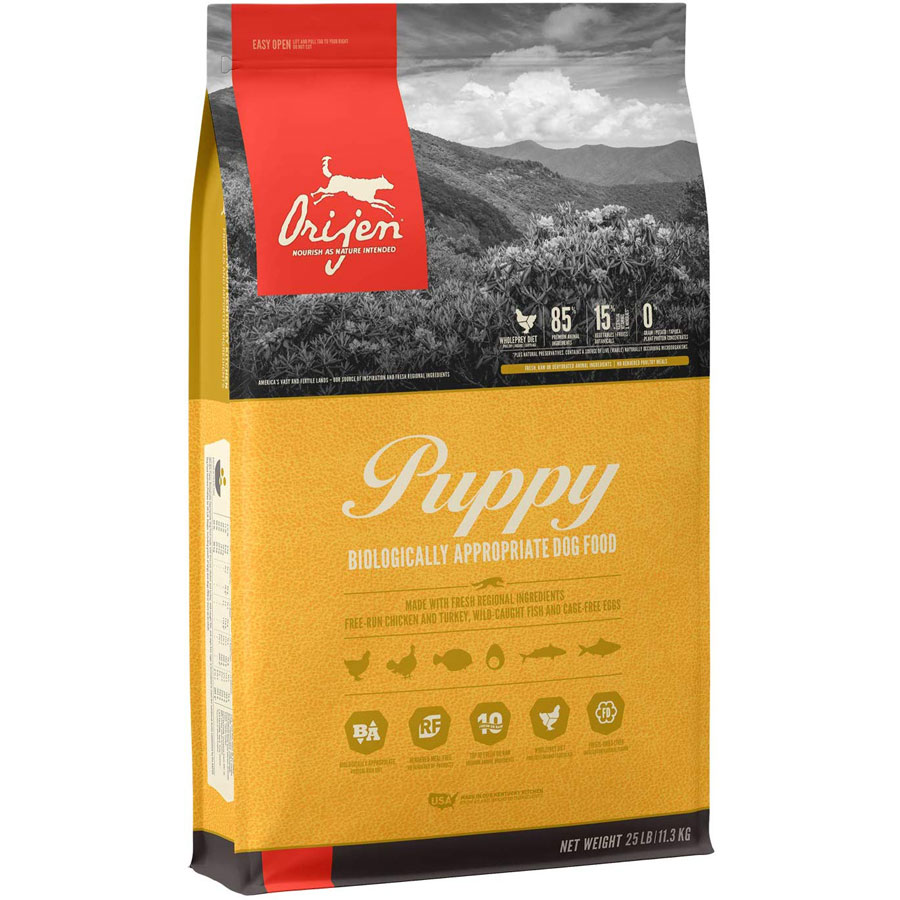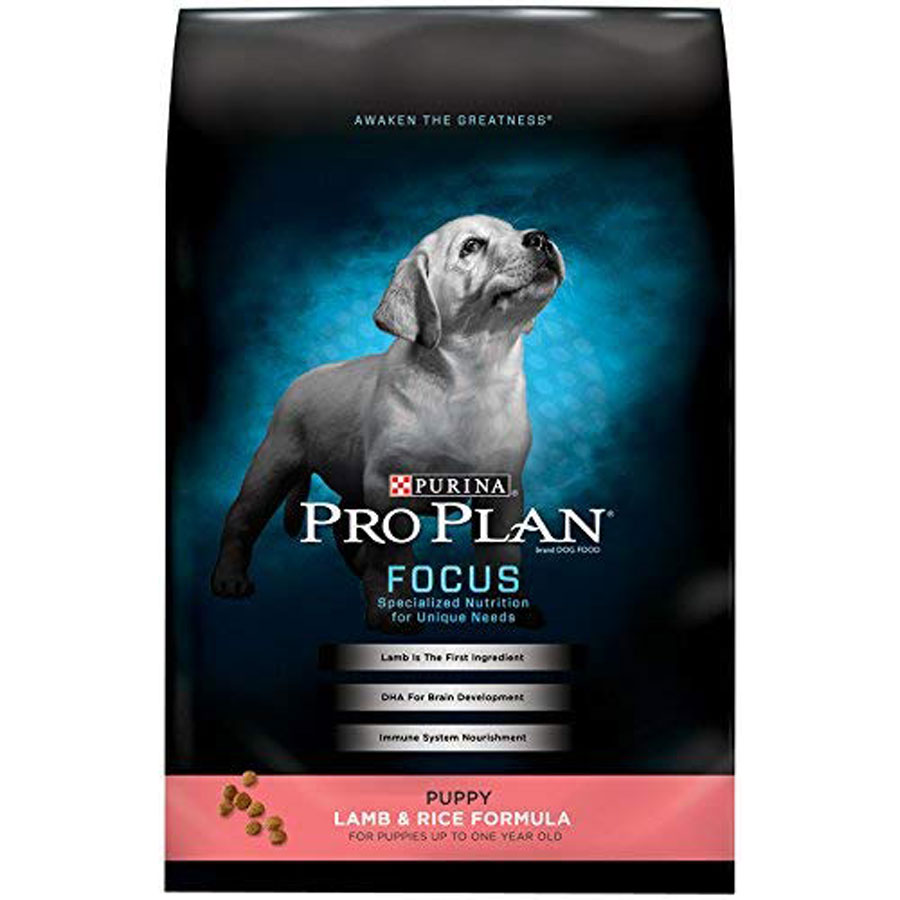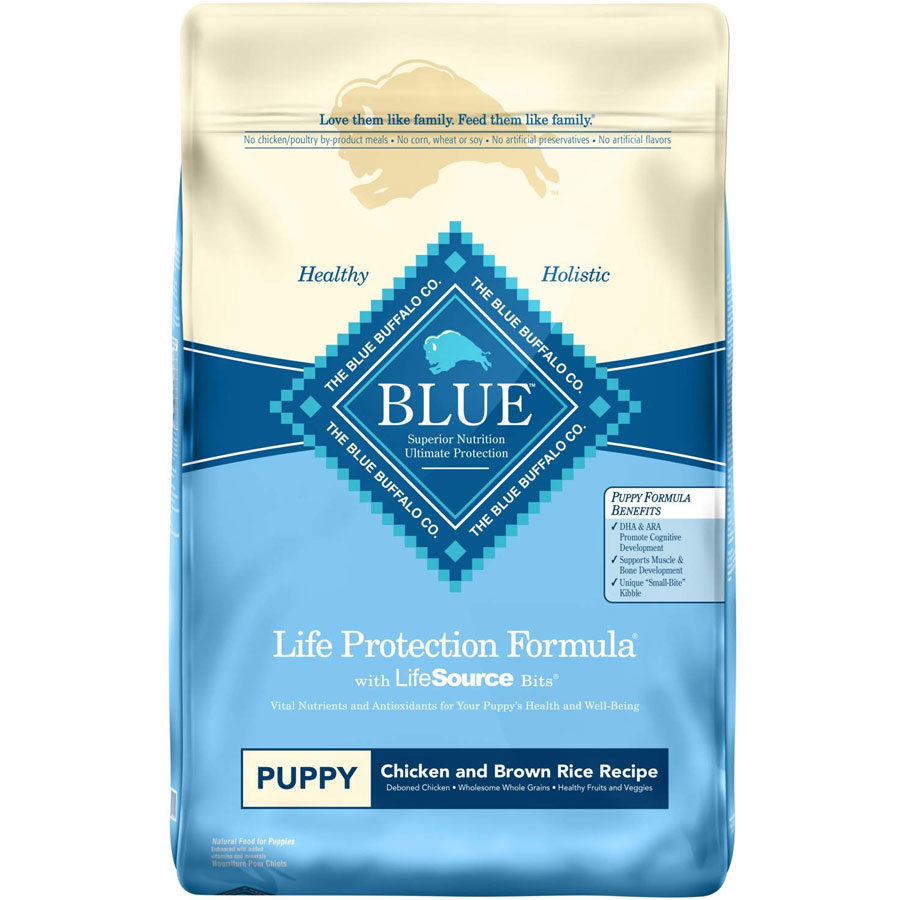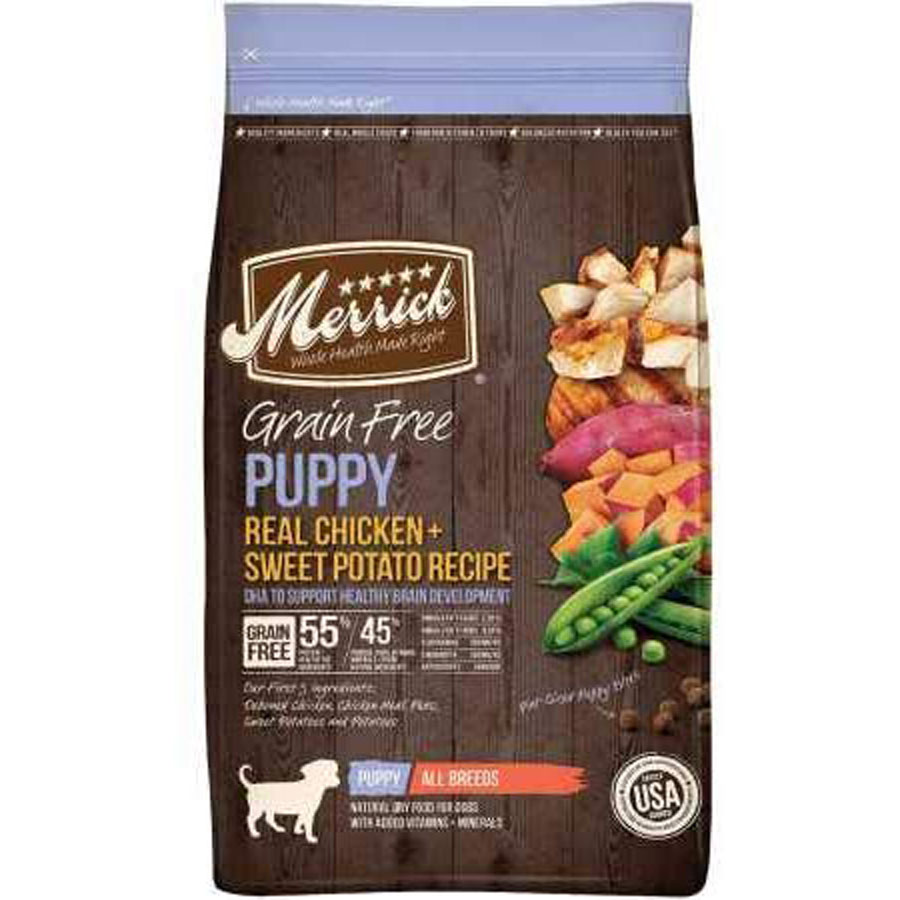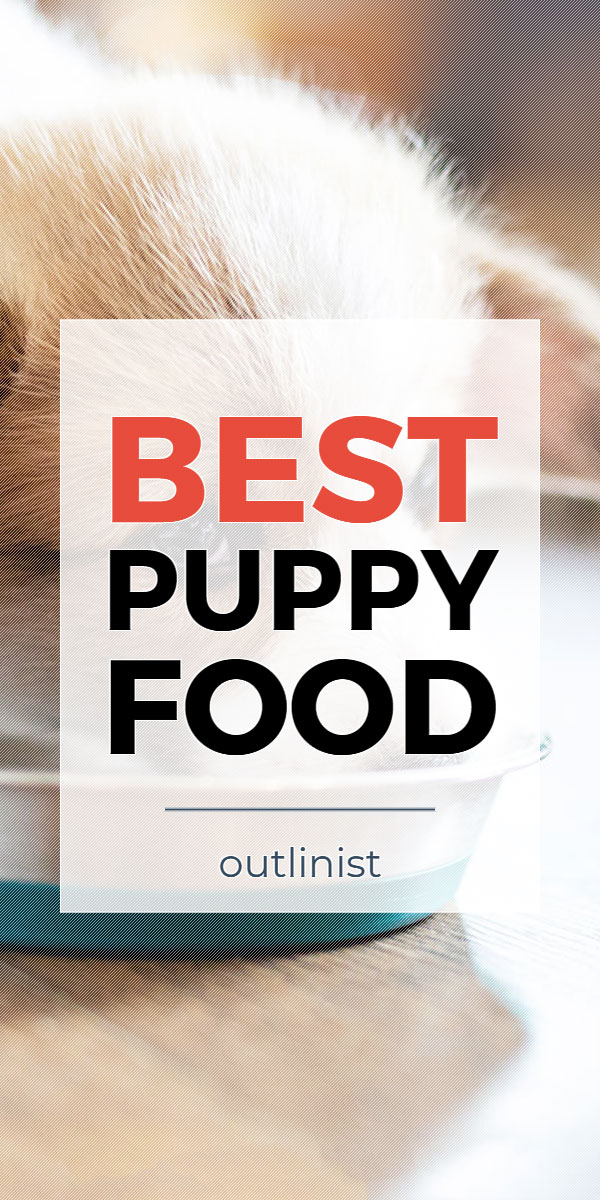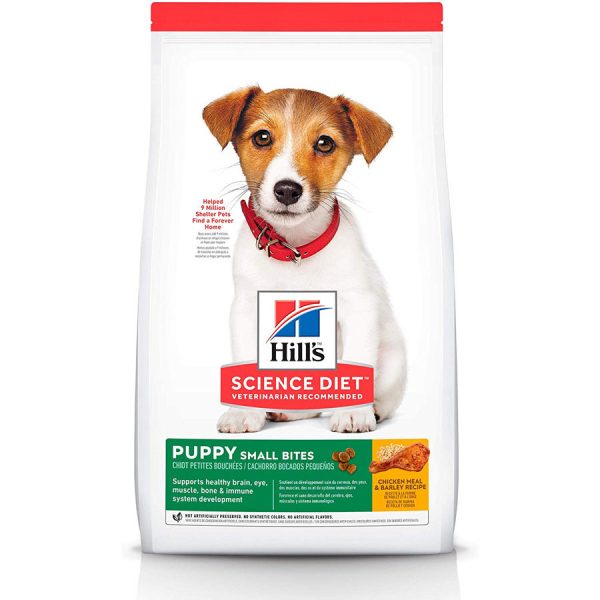
After 41 hours spent researching the best puppy foods, we think Hill’s Science Diet Recipe Dry Puppy Food is the best for most people.
This choice is based on several criteria: brand, type, life stage, size, flavor, formula, calories, protein, fat, balanced nutrition, DHA, gluten-free, grain-free, preservatives, and easy to digest, among other things.
| Product | Price | Overall Rating | Quality | Appearance | Taste | Scent | Value for Money | brand | type | life stage | size | flavor | formula | calories | protein | fat | balanced nutrition | DHA | gluten-free | grain-free | preservatives | easy to digest | |
|---|---|---|---|---|---|---|---|---|---|---|---|---|---|---|---|---|---|---|---|---|---|---|---|
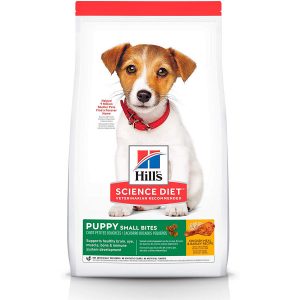 | Hill’s Science Diet Recipe Dry Puppy Food | Check Price | 4.2 | 4.5 | 4.0 | 4.0 | 4.5 | 4.0 | Hill's | Dry | 1 year & more | 4.5 to 30 lbs | Chicken | Chicken, barley | 374 kcal / cup | 25% | 15% | Yes | Yes | No | No | No | Yes |
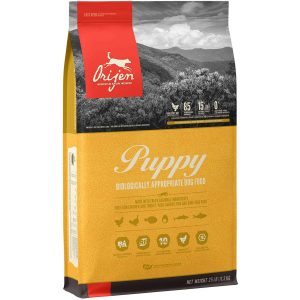 | Orijen High-Protein Grain-Free Puppy Food | Check Price | 4.9 | 5.0 | 5.0 | 4.5 | 5.0 | 5.0 | Orijen | Dry | All ages | 4.5 to 25 lbs | Chicken | Chicken, turkey | 449 kcal / cup | 39% | 41 % | Yes | Yes | Yes | Yes | No | Yes |
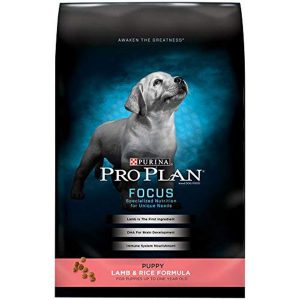 | Purina Pro Plan All Breed Dry Puppy Food | Check Price | 4.5 | 5.0 | 4.5 | 4.5 | 4.0 | 4.5 | Purina | Dry | 1 year & more | 5 to 34 lbs | Lamb | Lamb, rice | 457 kcal / cup | 28% | 18% | Yes | Yes | No | No | No | Yes |
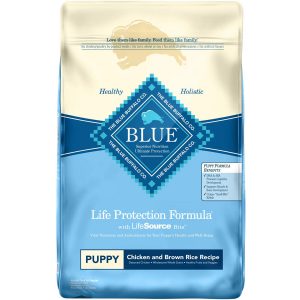 | Blue Buffalo Life Protection Formula Puppy Food | Check Price | 4.3 | 4.5 | 4.0 | 4.0 | 4.5 | 4.5 | Blue Buffalo | Dry | Puppy | 6 to 30 lbs | Chicken | Chicken, brown rice | 398 kcal / cup | 27% | 16% | Yes | Yes | Yes | No | No | Yes |
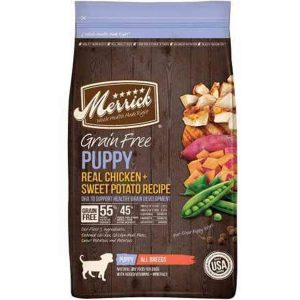 | Merrick Grain-Free Recipe Dry Puppy Food | Check Price | 4.8 | 5.0 | 4.5 | 5.0 | 4.5 | 5.0 | Merrick | Dry | Puppy | 4 to 25 lbs | Chicken | Chicken, sweet potato | 400 kcal / cup | 50% | 16% | Yes | Yes | Yes | Yes | No | Yes |
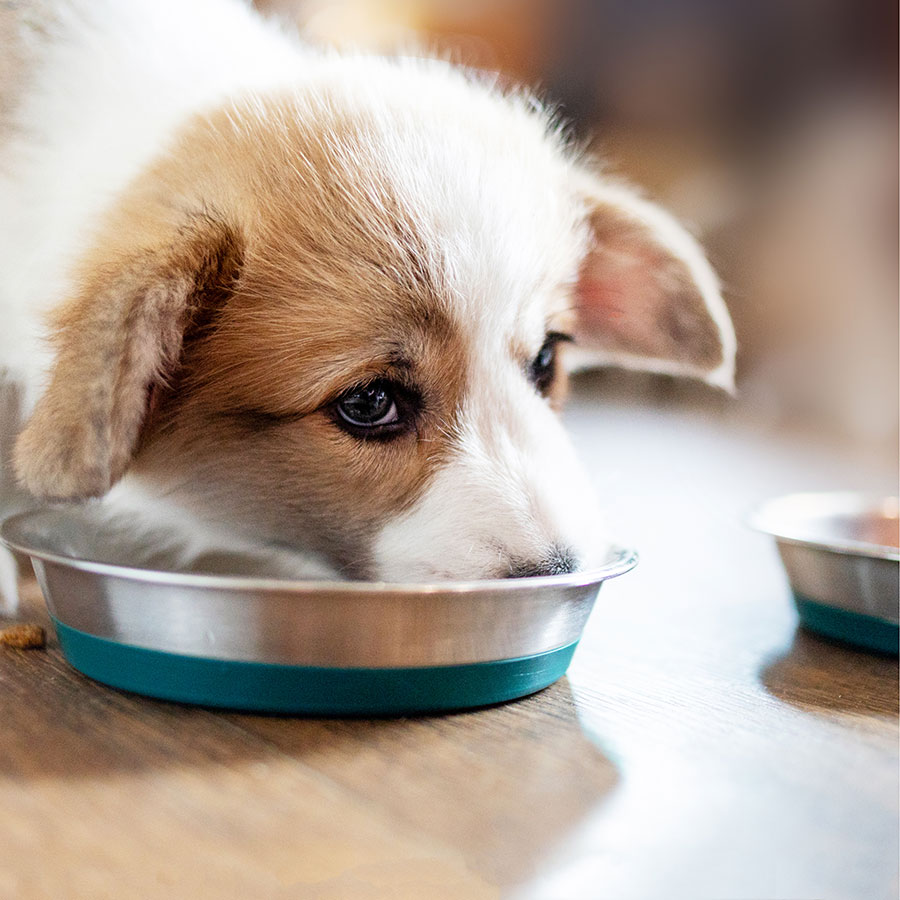
The growth and development of your new furry little friend is important, that’s why they need the best puppy food.
Not only will they grow up big and strong, it will give them all the fuel they need to run, scamper and roll about.
Puppies grow up fast, so take advantage of their carefree puppyhood before it’s over. When you have a puppy you don’t really have to think about getting them a dog grooming table just yet. They are much too young to be afraid of the dog nail clipper and dog dematting tool. Starting early, they may even grow to like the dog brush and entire grooming session.
Hopefully it will be a long time before they need a dog anxiety jacket or dog wheelchair, and it’s hard to imagine as they run carefree around their dog playpen. They know nothing of a dog bike trailer or dog bicycle leash; they only know about a dog retractable leash and dog collar for their short walks.
Before they even get a whiff of dog repellent, all they know is dog treats. The world they live in behind their dog gate is so happy, you may never want them to grow up. You just want to watch them drink from their dog water bottle or dog water fountain forever.
To make sure they can experience all of life, it’s important to give them a good start, which is why the dog food in their dog bowl or automatic dog feeder is crucial.
Soon they’ll be big dogs, carrying their dog backpack on a hike or run. They grow up so fast.
Selection Of The Best Puppy Foods
Here are the best puppy foods for most people according to Outlinist:
Buying Guide
Dry
The most widely available type of food, dry food is made from ingredients like grains and meat. Ingredients are combined, then cooked, a process which converts the starches into a form that can be easily digested.
Not only is dry puppy food easy to digest, it is easy to store because it doesn’t need to be refrigerated, it keeps your pet’s teeth clean and it’s easy on their tummy (as well as your wallet). Though the nutritional content is high, the texture can be rough on a young pup’s mouth.
Wet
Canned, or wet puppy food is a good choice if your little one prefers their food to be softer. Its high water content also makes it a good way to ensure your pet is getting enough water during the day.
Wet food contains fewer calories than dry which means it works well if you have a large breed who needs a slow and controlled growth rate for proper development. Pups love the strong taste and smell which helps build their appetite.
Semi-Moist
Semi-moist food gives you many of the benefits of dry and wet foods. Your pup can digest it rather easily and it is sold in pre-measured packages, making it practical to store and use. Unfortunately, though, it has very little dental benefits. This type of food also tends contain a high amount of salt, sugar and preservatives.
For many pet parents, the best way around this is to feed puppies a mix of wet and dry food, either combining them together in their bowl or alternating them each meal.
Proteins
It’s important to find puppy food high in protein, especially for larger breeds. To go further it needs to have the highest nutritional value. It should be highly digestible and easily absorbed, so any food you get for your pup should be made with whole or human grade meat – meat approved for human ingestion.
The best puppy food will have a whole protein that is identifiable like chicken, pork, beef or salmon at the very top of the ingredient list.
Carbohydrates
Carbohydrates are an invaluable source of energy for the daily activities of your furry baby and helps their internal organs function at peak performance. Look for puppy food grains made up of complex sugars and carbs because they have a high fiber content and give pups the burst of energy they need.
The main types of carbs you want in a recipe are going to include sweet potatoes, brown or white rice and white potatoes.
Fats
To fuel your pet’s never-ending energy, getting a puppy food high in fat is pretty important. Premium sources of fat ensure that a puppy’s skin, fur, teeth, brain and eyes are properly supported throughout their development.
The fats should be from natural and safe sources like fish, chicken or avocadoes. Healthy fats and oils are crucial for their internal system, too. Critical fats that should be on the ingredient list are fatty acids, Omega-3 and Omega-6 (flaxseed, fish meal, salmon).
Probiotics and Antioxidants
Probiotics are beneficial bacteria that are included in some puppy food recipes because they help with the intestinal function of your youngster. Though probiotics can also be purchased as a supplement, having them in your pet’s food is typically more cost-effective and convenient.
Antioxidants are necessary for keeping a pup healthy but also support their immune system. They are found in vegetables and colorful fruits like, carrots, pumpkin, spinach, kale and cranberries.
Healthy Ingredients
There are a couple of ingredients that you want to make sure you keep an eye out for as they make for a pretty good formula. Good puppy food ingredients are natural preservatives, chelates and fruits and veggies.
Only buy food if the preservatives are natural, like vitamins E and C or other plant extracts. Chelates are natural minerals that are obtained from inorganic compounds and are necessary to maintain and grow a healthy bone structure. Fruits and veggies promote the development of a healthy digestive system and encourage healthy cells.
Puppy-Safe Ingredients
There are a lot of filler ingredients that can make their way into a recipe and this is not what you want. Wheat gluten should be avoided because it is nutritionally incomplete and causes stomach sensitivity in many puppies.
Corn and corn syrup are some of the toughest grains to digest and can also result in allergies. Artificial colors and flavors have absolutely no nutritional value and can predispose your pet to serious health conditions as most are carcinogens. Meat meal, rendered fat and chemical preservatives should be avoided as well.
Grain Free
Though grain-free puppy food is more expensive than a lot of other types of dog food, it is one of the best choices you can make for your growing dog because it enhances their overall wellbeing. Grains in a dog food recipe can encourage inflammation and overactive immunity.
A grain-free formula is one of the best puppy foods because it reduces shedding, increases energy levels, reduces food allergies, promotes better oral breath and health and has ingredients that are high in quality.
Serving Size
Don’t fool yourself into thinking that puppy food portions don’t matter because they do. Take into consideration the personal relationship your pet has with food (learn it if necessary) and you’ll know if they can be trusted to self-regulate their eating.
Take a good look at the bag or can of food you’re buying and make sure that it is not so high in calories that only a little bit gives them all the nutrition they need without actually filling their tummy up.
Transition
There are a lot of steps in between being a puppy and being an adult dog and the best puppy food is going to depend on your pup’s needs. If they are still exhibiting high amounts of energy, you’ll have to keep feeding them food with a high calorie content.
For those with more laid back dogs, you may see they outgrow their puppy phase early and you might need something designed for “older puppy” or “young adult” dog diets.
For Enhanced Coat and Fur
If you want a puppy with a beautiful, lush fur coat and healthy skin, what you feed them is going to be pretty important. Their food should be rich in nutrients, with protein topping the list of ingredients they need with essential fatty acids following that.
Other important ingredients are linoleic acid, zinc and B vitamins as they keep skin healthy and leave puppies with incredibly soft fur. Sunflower oil, chicken fat and fish provide their coat with a natural lubricant.
For Weight Loss
If your little furry baby is starting to bulge at their seams, exercise is always helpful but so is managing their diet. Getting a food for your pup that encourages them to shed a few pounds is a great way to ensure they are not ingesting way more calories than they are actually using.
Look for food recipes that are low in fat – less than 400 calories per cup – and are high in protein. Ingredients should be whole protein, no puppy food meat byproducts or meat meal and it should be fortified with probiotics.
Vet Recommended
Being the new parent of an adorable fuzzy puppy can be overwhelming so always remember that your veterinarian is going to be your guide. They know much more than you do and have plenty to say about types of food for your puppy.
Any puppy food vets recommend is going to be based on their breed, medical history, weight, size and other genetic factors. They will only recommend the best puppy food that’s high in vitamins, minerals, essential fats and whole meats.
Frequently Asked Questions
Can puppies eat regular dog food?
Yes, puppies can eat regular dog food – they probably shouldn’t though. Feeding a puppy regular dog food isn’t going to hurt you pup, it does have the necessary nutrients canines need to survive. But, your baby pooch won’t thrive on adult food the way they would with puppy food.
Adult dog food tends to have higher concentrations of empty calories which are of little to no nutritional value. Your young doggy may not be able to develop as well as they could without puppy food.
What is the difference between puppy and dog food?
Special food for puppies is designed to address their dietary needs between the time they are weaned from their mother to when they have developed enough to eat adult dog food. The biggest difference between the types of food is the amount of protein.
There is a higher percentage of protein in a puppy dog food because it is a fundamental building block for their growth. Puppies are known for their high amounts of energy which burns a ton of calories so their food also has a higher calorie content.
What should you feed an underweight puppy?
If you think your puppy is underweight, they’ll most likely have lower levels of energy and you may even see their ribs protruding. Scaly looking skin can also be a direct result of low-quality heating habits.
The best puppy food to help them lose weight will have a higher amount of calories and protein. You should also look at food growth formulas specially made for puppies and add high calorie treats to their diet. This will help them gain weight without becoming overweight.
Is raw food okay for puppies?
Contrary to what most people think, a diet of raw food is more than bloody meat. This diet also refers to raw food that has been freeze-dried and dehydrated. A raw food diet provides your growing dog with the nutrients necessary to develop properly.
Raw food not only leads to healthier skin, a shiner coat, and cleaner teeth, but also to higher energy and a healthier digestive system. Be careful as it does carry with it a risk of bacteria and bones that can hurt young dogs.
What are the daily calories your puppy needs?
Puppies need water, carbs, minerals, fats and vitamins to thrive. They also need the right number of calories depending on their breed.
Small breeds less than 20 pounds should eat about calories per day, with 23-28% coming from proteins and 15% coming from fat at least. Medium breeds, 21-50 pounds, need 600 calories per day as puppies with 22% coming from protein and 10% from fats. Large breeds over 50 pounds need about 23-25% of their calories from protein and 12-15% fat. They need a whopping 1000 calories per day.
Sources
- Pet food that makes your dog live longer?, Federal Trade Commission, Aug 4, 2016
- Dog food, Wikipedia
- Pet Food Safety: Healthy Pets, Healthy People, Centers for Disease Control & Prevention
- Tips for Safe Handling of Pet Food and Treats, U.S. Food & Drug Administration, Oct 19, 2017
- What to Look for on a Pet Food Label, Veterinary Medicine at Illinois, Jan 22, 2018
- Mercury levels in pet food to be studied in new University project, University of Nevada, Reno, Jul 17, 2018
- Evaluation of storage mite contamination of commercial dry dog food, National Institutes of Health, Aug 19, 2018
- Pet Food, U.S. Food & Drug Administration, Aug 1, 2018
- Best Food for Your Pet, Clinical Nutrition Service at Cummings School
- Pet food (wet), Transportation Security Administration
